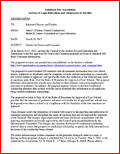The Long March: Project to Revise Law School Accreditation Standards Shows Steady Progress
In 2008, the ABA Section of Legal Education and Admissions to the Bar, which is designated by the U.S. Department of Education as the accrediting body for U.S. law schools, initiated a comprehensive review of the standards it applies when conducting evaluations.
Four years later, the section’s Standards Review Committee still is plugging away at the task—standard by standard, word by word, even punctuation mark by punctuation mark. So far, only one item is on the fast track for action by the section council, which has final authority over changes in the Standards and Rules of Procedure for Approval of Law Schools.
The Standards Review Committee has proposed a revised version (PDF) of Standard 509 that would expand the amount of consumer information that law schools must make available to students and applicants, including employment outcomes for graduates. Under the committee’s proposal, law schools would be subject to sanctions for providing incomplete, inaccurate or misleading consumer information in violation of Standard 509.
A number of law schools have come under fire recently for filing misleading information about employment of their recent graduates, and there have been calls for the legal education section to be more diligent about ensuring that information put out by law schools is accurate. Among those weighing in on the issue have been U.S. Sens. Barbara Boxer, D-Calif., and Chuck Grassley, R-Iowa.
HOUSE TO HAVE ITS SAY
The proposed revisions to Standard 509 were scheduled to be considered for final approval by the section council at its June meeting. But even though the council has the ultimate power to approve changes in the standards pursuant to U.S. Department of Education regulations governing accrediting bodies, the ABA House of Delegates would still get to have its input. Under Section 45.9 of the House Rules of Procedure, the House may concur in the changes being made by the section council or refer them back to the council for reconsideration. The House may refer revisions in the standards back to the council only twice; after the second time, the council’s decision is final.
If the legal education section’s council approves the revisions to Standard 509 in June, there would still be time to submit them to the House of Delegates for consideration in August at the 2012 ABA Annual Meeting. But unless the House concurs in the changes this summer, it’s possible they wouldn’t become final until after the 2013 ABA Midyear Meeting next February.
Public reaction to the proposed changes, which were posted for notice and comment through late April, has been largely favorable, although a few commentators took issue with the council’s tentative decision not to require law schools to post school-specific salary data about graduates on their websites, a step the committee had recommended.
The Standards Review Committee is making considerable headway on several other fronts, as well. It has been through several redrafts of all standards, which fill seven chapters of substantive requirements covering everything from organization and administration to libraries and information resources. And the committee has made tentative decisions about how to proceed on several potentially contentious issues, such as whether to keep the current requirement that all law school applicants take a valid and reliable admissions test—that means the Law School Admissions Test.
At its most recent meeting in April, the committee tentatively agreed to forward two alternative proposals regarding the test requirement to the council: One would keep a pared-down version of the current requirement in the standards and the other would eliminate it altogether.
The Standards Review Committee also is considering whether to give the council an either/or option in regard to whether law schools must grant tenure or other forms of job security to all full-time faculty members. One proposal being considered by the committee would require law schools to provide tenure or presumptively renewable long-term contracts to all full-time faculty members.
The alternative proposal would not provide for tenure, but would require law schools that don’t provide such job protections to show that they are able to attract and retain a competent full-time faculty sufficient to accomplish their mission. (The current standard says that law schools should have an announced policy with respect to tenure, but it doesn’t say what that policy should cover or how it should be enforced.)
But four years into what was supposed to be a three-year project, the committee still has a long way to go. It plans to review every chapter of the standards at least three more times before formally recommending revisions to the council. The committee recently posted on the section website a tentative meeting schedule that runs through July 2013, its target date for producing all of its recommendations to the council.
At that rate, the committee’s final recommendations won’t be before the council until August 2013 at the earliest, and couldn’t realistically come before the House until 2014.
Committee chair Jeffrey Lewis, a professor and dean emeritus at Saint Louis University School of Law, makes no apologies for the project’s time frame. It’s a huge job, he says, that consists of many complicated and interrelated parts.
“There’s no rush here,” Lewis says. “Our only imperative is to get it right, which is what we intend to do.”
Write a letter to the editor, share a story tip or update, or report an error.



